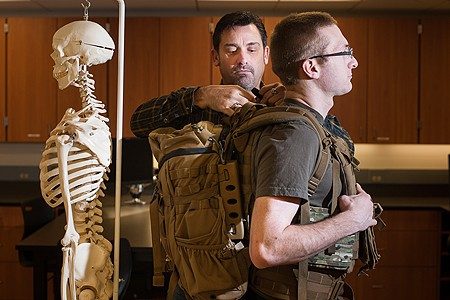Dr. Brian Higginson is an associate professor of human physiology and a former soldier. His research is focused on refining training protocols and improving equipment to the benefit of soldiers and first-responders. In an ongoing project, Higginson is bettering the biomechanics and ergonomics of military load carriage systems (primarily backpacks); read more about that project. Higginson notes, “Being prior service, my main focus and drive with this line of research is to help the guys that are still out in the field, whether that be contributing to better equipment and load carriage system designs to make their job easier, or increasing their chance of returning home at the end of their tour.“
His current research involves studying threat assessment: tracking subjects’ eye movements in simulated threat scenarios and analyzing that data cross-referenced with subjects’ performance. The results of this research will inform training for soldiers and police officers, aiming to improve the accuracy of assessments (friend or foe) and decrease friendly fire incidents. As he describes it, “[the] change in my research focus over the past few years has been going from simply product testing and evaluation, including load carriage and body armor systems, to research aimed at increasing performance and survivability of military personnel while performing their duties. My most current project is designed to help decrease the risk of friendly fire incidents and civilian casualties during wartime.” He is collaborating with the Army Human Performance Lab in Maryland (which specializes in equipment/user interface optimization and military performance research). The results of their research can be provided directly to military training divisions to better prepare personnel working in the field.
Higginson provides opportunities for undergraduate human physiology students in his research. Each year, one to three students assist with his research projects. This mentoring gives the students applied research experience, and can provide opportunities to present at conferences. His two most recent research assistants (both Gonzaga Human Physiology graduates) are now both in graduate school; one will soon be joining the Navy’s Aerospace Physiology research lab in San Diego.
Furthering the health sciences through applied research and compassionate caretaking. Please click here and select SNHP Excellence Fund as your Gonzaga Will priority to support the SNHP.
